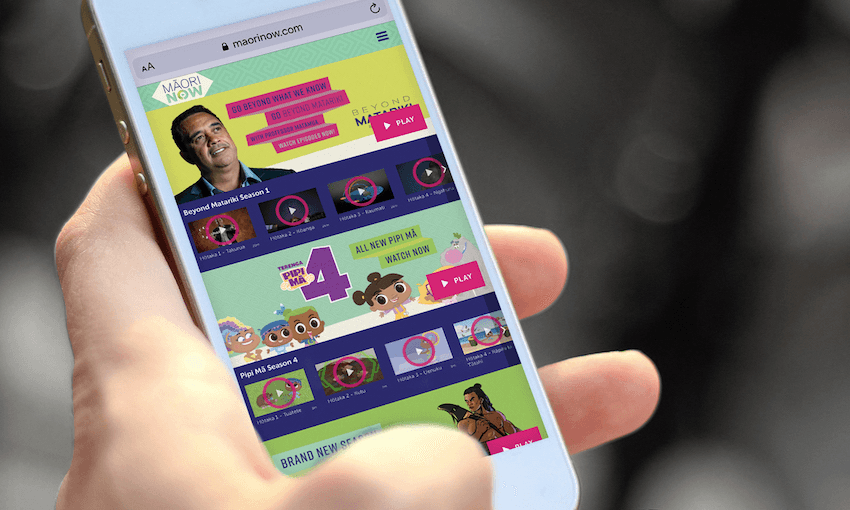For the last four years the duo behind wildly popular children’s cartoon Pipi Mā have been working on a digital Māori content platform to rival the big streaming services. Today, MāoriNow is ready.
When Hōhepa Tuahine and Kristin Ross were growing up, there was only one broadcast television channel. Ross remembers the conversations surrounding the decision to introduce more channels, people wondering if there would be enough content to fill all the time slots, and whether people even really cared for more programming.
A lot has changed in the decades since. Now, with online streaming services taking over from linear television models, Tuahine and Ross are adding a Māori-focused option to the slate of digital entertainment offerings with their new app, MāoriNow – which launches today.
“MāoriNow is like the TV2, and I know there will be more and I invite that to happen because that gives us diversity of Māori voice and it also gives us a range of Māori content to choose from,” says Tuahine.
Competing with the likes of local streaming services ThreeNow and TVNZ OnDemand, and international offerings like Netflix and Disney+, MāoriNow fills a niche Ross doesn’t think is being catered to, one focused on showcasing high quality fluent Māori content.
“That narrows our audience down but we believe that in the digital world, niche is king. It’s like the anime apps, people go to those because they only want to watch anime.”
Fluency is one of the pair’s main focuses for the content that will be hosted on MāoriNow. It’s their way of fighting against the funding models that often focus on those learning the language, missing out on those who already have the reo, and want quality content to watch, they say. Ross explains it’s like a spectrum. Those on the left have little to no interest in the reo, and those on the right are fluent. Without high-quality fluent content, those on the right risk sliding left.
“We need all sorts of drama and high quality TV for the people on the right of the spectrum because we exhaust so much energy and focus on the left we actually become neglectful of the audience on the right,” Ross explains.
But that’s not to say MāoriNow won’t be available for people at any point on the spectrum. Subtitles will be offered to help anyone without a full grasp of the reo to enjoy the content, though Ross says good storytelling has never been about language anyway.
“Series like Money Heist, Unorthodox – those dramas were filmed in the native languages of the countries they were filmed in, yet they transcend borders because the story is compelling. The story is powerful and it’s what translates to people.”
Something the pair don’t have in common with Netflix is a subscription model, but the money side isn’t a focus for either at the moment. For the past four years they’ve poured money into building MāoriNow, and they’re excited to put it into the world as a free offering, at least for now.
“The goal right now is to build the library of content, build the catalogue and bring eyes to the platform, and we’re willing to bear those costs until we see a sustainable way to make MāoriNow run.”
Ultimately, they want support on a government level for projects like MāoriNow, which are catering to an audience they don’t think is being reached, even by dedicated Māori channels like Māori TV.
“What we would like to see is how the government recognises MāoriNow as a credible platform for broadcasters and is supported in the same way as Māori Television and TVNZ are supported to operate and produce content for its audiences.”
They’ll be working closely with content creators to acquire content for MāoriNow, with hopes that it can become a forever home for Māori video that’s been gathering dust and for new stories, too. Ross says it’s a shame when content goes unnoticed because it doesn’t fit in the linear schedule.
“We have a lot of amazing content that is just collecting dust on the shelves, and I know as a storyteller that people put their hearts and souls into productions with the intent of bringing value to their audiences.”
Ross and Tuahine believe MāoriNow will help to carve a pathway towards Māori story sovereignty. What that looks like is yet to be discovered, but Ross says it was time to do something to address the gaps our state broadcasters aren’t addressing in Māori content.
“What is Māori story sovereignty and what does it mean to have sovereignty as a Māori storyteller? We can discuss those things until the cows come home but unless we actually start carving pathways and solutions to some of those questions, then all we’re doing is discussing,” she says.
“MāoriNow is a push towards the idea of Māori story sovereignty and Māori control of story, it sets us up to have a place that champions that type of content.”
MāoriNow is available from June 4 on the app store and www.maorinow.com.



